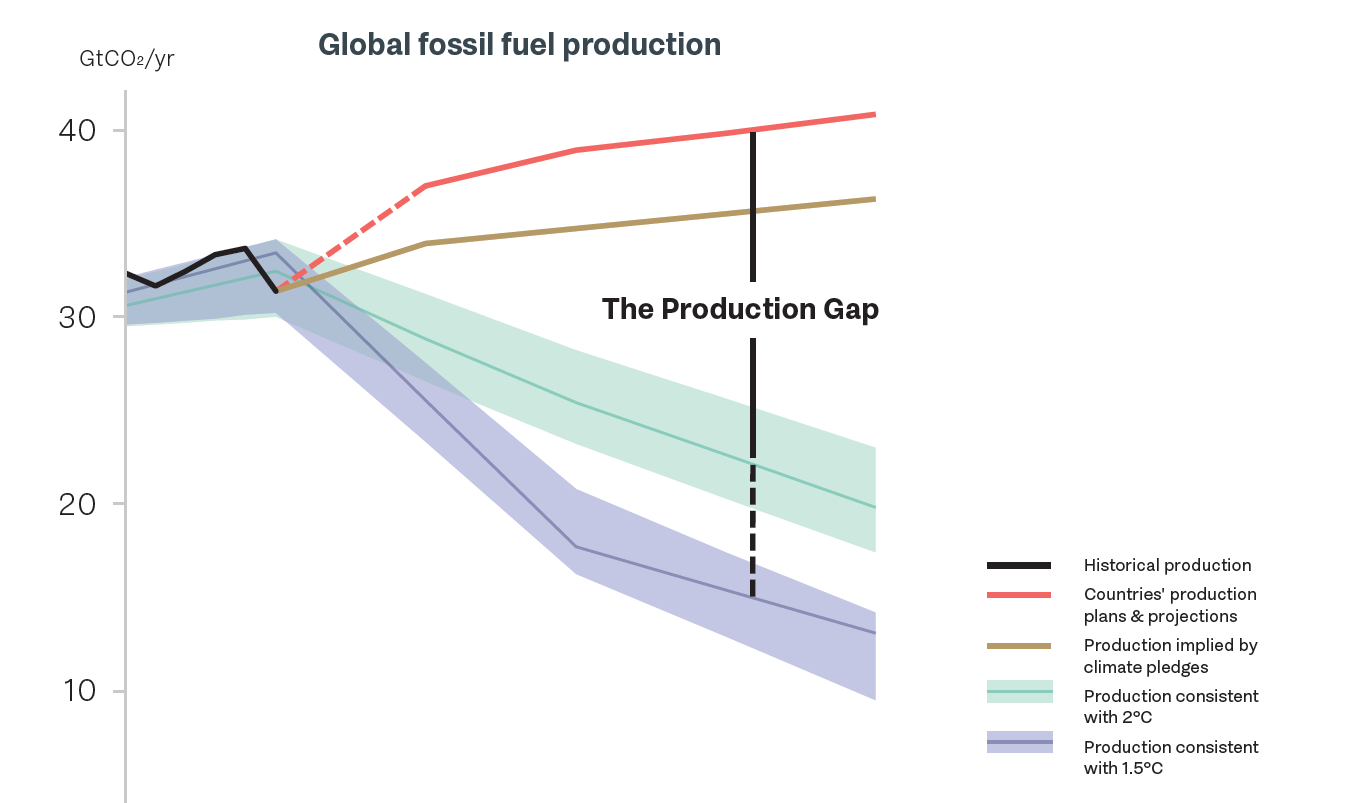
Production Gap Report: Governments must act now to wind down fossil fuels
A new report, published today by UNEP and other environmental groups, outlines the “Production Gap”, the discrepancy between countries’ planned fossil fuel production and global production levels consistent with limiting warming to 1.5°C or 2°C.

Production Gap graphic
This year started with wildfires running wild across Australia and ends with the news that 2020 is set to be the warmest year on record. These impacts already have dire consequences for both people and planet.
The latest news being that due to warming waters, amongst many other vital ecosystems, the state of the Great Barrier Reef is now critical.
And although the world has been rightly preoccupied by fighting the global COVID pandemic, every day our climate emergency has intensified. The problem never went away.
And now we have a unique opportunity as the world begins to plot a post-pandemic path to tackle COVID and climate at the same time. Speaking earlier today, Mark Carney, Former Bank of England Governor turned UN climate envoy told the BBC that we can tackle climate, COVID, and the lingering credit crisis in one.
“One of the challenges we have, if we step back from the COVID crisis, the climate crisis, the aftermath of the credit crisis, is something that is very positive but could also be as challenging,” he said. “[This is] the fourth industrial revolution, this technological revolution, which really is starting and has been accelerated by the COVID crisis.”
And by the fourth industrial revolution, Carney means the renewable revolution. What Carney is saying is nothing new: we need to divest from fossil fuels and invest in renewables fast if we want to keep temperature rises to 1.5°C. If we undertook a rapid and just transition we could help economies recovery from COVID and help struggling families offering them secure jobs, helping people finally escape the lingering legacy of the credit crisis.
We could solve all problems in three. It may sound simple. And of course it is. As usual we are doing the opposite of what is needed. A new report, published today by UNEP, the Stockholm Environment Institute (SEI), the International Institute for Sustainable Development (IISD), the Overseas Development Institute, and E3G, outlines the “Production Gap”, the discrepancy between countries’ planned fossil fuel production and global production levels consistent with limiting warming to 1.5°C or 2°C.
Written with contributions from OCI’s Bronwen Tucker, Laurie van der Burg, and Romain Ioualalen, the annual report outlines that to follow a 1.5°C-consistent pathway, the world will need to decrease fossil fuel production by roughly 6% per year between 2020 and 2030.
It warns that “governments continue to plan to produce coal, oil, and gas far in excess of the levels consistent with the Paris Agreement temperature limits”. However, in contrast, to date, “governments have committed far more COVID-19 funds to fossil fuels than to clean energy.”
The report outlines how “Countries are instead planning and projecting an average annual increase of 2%, which by 2030 would result in more than double the production consistent with the 1.5°C limit”.
This means that countries are currently “aiming to produce 120% and 50% more fossil fuels by 2030 than would be consistent with limiting global warming to 1.5°C or 2°C, respectively.”
The bottom line is that “Policymakers must reverse this trend to meet climate goals,” in order to “undertake a just and equitable transition from fossil fuel production.”
As the Executive Director of the Stockholm Environment Institute, Måns Nilsson, said: “This report shines a light on how government action, in many cases, risks locking us into fossil-fueled pathways. And it lays out the alternative, with solutions and examples for moving beyond coal, oil, and gas production. It’s time to imagine, and plan for, a better future.”
It also calls for an equitable approach to phasing out production, with countries with lower dependence and higher financial and institutional capacity can undertake a just and equitable transition from fossil fuel production most rapidly, while those with higher dependence and lower capacity will require greater international support.
The report also included data from the Energy Policy Tracker showing that G20 governments’ reactions to COVID so far do not bode well. To date, they have committed over US$230 billion in COVID-19 measures to sectors responsible for fossil fuel production and consumption, far more than to clean energy (roughly US$150 billion).
“Pre-COVID plans and post-COVID stimulus measures point to a continuation of the growing global fossil fuel production gap, locking in severe climate disruption,” says the report.
As OCI analyst Bronwen Tucker pointed out earlier this year, “Fossil fuel CEOs and their politician and billionaire friends are doing their best to profit from this moment. But the overwhelming call from civil society has been for governments to support a transition from fossil fuels that protects workers, communities, and the climate in order to build a more just and resilient future instead. We need creative, fearless cross-movement organizing to win.”
Inger Andersen, the head of the UN Environment Programme told the Guardian: “With governments injecting trillions into their economies, we find ourselves at a critical juncture where decisions can either further lock in fossil fuel energy systems or transition us to a cleaner and safer future. This year’s devastating forest fires, floods, and droughts serve as powerful reminders for why we must succeed.”
